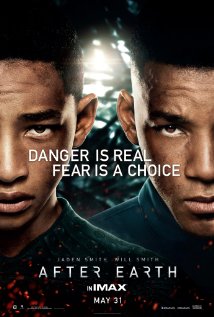Sci-Fi, 100 Minutes, 2013
This may not actually be as bad as you may have heard but lordy, lordy it ain’t good. A lot has been said about M. Night Shyamalan’s [IMDB] fall from grace. I’m not one to kick a man when he’s down but dammit, this guy does not make it easy.
[Minor spoilers follow. Sorry.]
The movie has so many self-inflicted wounds it becomes hard to take it seriously. It has significant issues with its visuals. While some are beautifully high-end others are absolutely terrible. The industrial design is clearly supposed to look “futuristic” and “organic” but it just looks cheap and imprecise. Many of the props look more “Fisher Price” than “movie magic”.
While Jayden Smith [IMDB], who plays our hero, Kitai, may be a decent actor the movie specifically and repeatedly plays to his weaknesses. His opening narration, for example, is impossible take seriously due to the (possibly directed) slurring of words, odd inflections and bizarre affectation. His “sir” becomes “suh”, “effort” becomes “efur” and “earth” becomes “erf”.
The problems are exacerbated by the terrible choices the script makes. Monsters called “Ursa” (Smith’s mush-mouth makes that “usssha”) – huge, gangrel, non-symmetrical, toothy, grabby things – are dropped by anonymous aliens to hunt humans. His father, “Cypher Raige”, invented the only way to fight the Ursa effectively: ghosting. The “technically blind” Ursa can only see us when we’re scared; facing them without fear, “ghosting”, makes us invisible to them. There are so very many issues with this.
- If an advanced alien race really wanted to exterminate humans why not simply introduce a human-killing virus or microbe? How could it possibly be more efficient to throw Rhino-sized attack monsters around?
- The script wants distance from Earth so it sets itself 1,000 years in the future. It also wants to make a God of Cipher Raige so it allows him to invent ghosting. So how did we fight the monsters before then?
- In the movie the Ursa displays remarkable intelligence. It sets traps designed to frighten humans into “showing themselves”. These traps would require a significantly better sense of the environment than we’re told the Ursa have.
- Why is ghosting even needed in a technologically advanced society? The survival suit that Kitai wears, if fitted with gloves and helmet could clearly prevent our scent from escaping during battle. In one scene, in fact, a child is saved from attack by hiding in a large terrarium – if that’s all it would take why doesn’t every home have such scent-proof safe room? There are literally dozens of ways smart, adaptable humans could confuse, distract and defeat such singularly adapted hunters.
Most of the movie takes places in a lush, green old world forest. Yet we’re also told that it “freezes over in minutes” each night (yes, we see it and, yes, it’s just as stupid as it sounds). This requires our hero to make it to heat-harboring hot-springs each night survive – yet we see many animals (impossibly evolved) throughout the journey that seem to deal with this quite easily. A constant, impossibly fast, freeze-and-thaw cycle also seems to have no effect on the abundant trees, shrubs or ferns either.
This is all just lazy writing designed to support the demanded outcome no matter the sacrifice to realism or common sense. Great Science-Fiction creates a world and rules that operate in that world and then places us within it. Bad Science-Fiction creates a story then forces the world to accommodate it no matter the cost. The audience is treated like ignorant fools to reach a pay off that they can’t enjoy properly after being handled so roughly.
Like so much recent Sci-Fi this could have been so much better if there was more respect for the “Sci” and less dependence on the “Fi”. Relatively simple changes could have easily made the story less intellectually appalling without affecting the outcome. They probably should have also just dropped the whole bit with that damn bird.


While I was watching this film, I couldn’t help myself from being interrupted with repetitious thoughts of the word “nepotism”. I read another review of After Earth, calling it “Escape from planet nepotism”, which made me chuckle